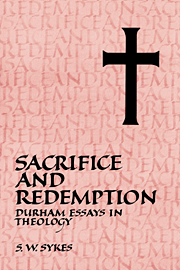Book contents
- Frontmatter
- Contents
- List of contributors
- Prefatory note
- Introduction
- PART I
- PART II
- PART III
- 11 The conscious and the unconscious sacrifice: Kierkegaard on art, suffering and religion
- 12 Pearse's sacrifice: Christ and Cuchulain crucified and risen in the Easter Rising, 1916
- 13 The concept of sacrifice in Anglican social ethics
- 14 Eucharistic sacrifice: the problem of how to use a liturgical metaphor, with special reference to Simone Weil
- PART IV
- Index of biblical and ancient references
- Index of persons
14 - Eucharistic sacrifice: the problem of how to use a liturgical metaphor, with special reference to Simone Weil
Published online by Cambridge University Press: 10 March 2010
- Frontmatter
- Contents
- List of contributors
- Prefatory note
- Introduction
- PART I
- PART II
- PART III
- 11 The conscious and the unconscious sacrifice: Kierkegaard on art, suffering and religion
- 12 Pearse's sacrifice: Christ and Cuchulain crucified and risen in the Easter Rising, 1916
- 13 The concept of sacrifice in Anglican social ethics
- 14 Eucharistic sacrifice: the problem of how to use a liturgical metaphor, with special reference to Simone Weil
- PART IV
- Index of biblical and ancient references
- Index of persons
Summary
My interest in Simone Weil is not primarily in her very many merits, but in what helped to bring her to her death. I would not deny that she was one of the great minds of this century, and that whatever she wrote, whether for publication or for her own needs, is marked by her own inimitable authority. We can rely on argument for her merits from writers as different as Professor D. Allen, with his critique of that egocentrism which infects our culture, and is at odds with Christianity's doctrines of co-inherence in their many forms; and Professor D. Z. Phillips, not least with regard to her hunger for the transcendent.
We may recall that terrible prayer she wrote towards the end of her life (Weil 1970b, 243-4, see also Weil 1978b, 196) though she did insist to herself that one could not voluntarily demand what the petitions were for, that such prayer was despite oneself, though with consent, entire and without reservation, a movement of the whole being. The prayer included petition to the Father to grant her in the name of Christ, ‘That I may be unable to will any bodily movement, or even any attempt at movement, like a total paralytic. That I may be incapable of receiving any sensation, like someone who is completely blind, deaf, and deprived of all the senses. That I may be unable to make the slightest connection between two thoughts She asked for will, sensibility, intelligence, love to be stripped away, ‘devoured by God, transformed into Christ's substance, and given for food to afflicted men whose body and soul lack every kind of nourishment.
- Type
- Chapter
- Information
- Sacrifice and RedemptionDurham Essays in Theology, pp. 247 - 262Publisher: Cambridge University PressPrint publication year: 1991
- 1
- Cited by



